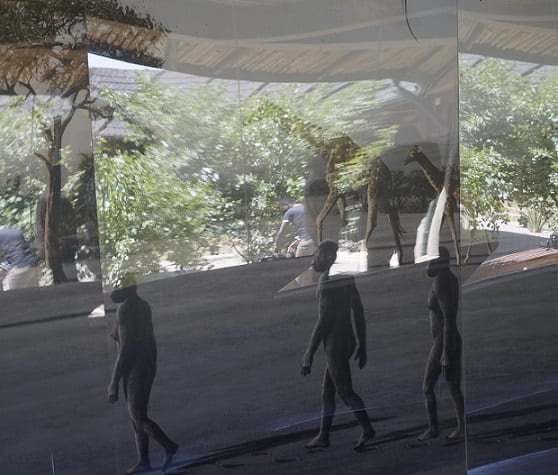Travel
An international team of archaeologists and paleoanthropologists has discovered a large collection of two million years old stone tools, fossilized bones, and plant materials at the Olduvai Gorge in northern Tanzania.
Newly-discovered stone reveals that the earliest humans used diverse, rapidly-changing environments in Africa to run early life on Earth. Dating as far back as 2.6 million years ago, the newly-discovered tools were likely manufactured by the early humans. Olduvai Gorge is now a key Tanzania tourist site where visitors can learn about human evolution and prehistory.
This important place reveals that the early life of humans reveals they lived primitively among fierce wild animals in a harsh African environment during those early days of human evolution. The new discovery including concentration of stone tools and animal fossils of different mammals at the excavation site, provide evidence that early man lived together with wild animals around water sources.
Recent research reveals that the geological, sedimentary, and plant landscapes changed quickly in Africa, giving evidence of the existence of early humans with tracks of early life on Earth to have started on this continent.
The Olduvai excavation site is a magical tourist site that attracts local and international tourists to visit and experience what it may have felt like to live as the earliest man did. Discovery of Hominid remains date back to 1.75 million years ago.
This site is a small canyon about 41 kilometers north of the famous Ngorongoro Crater, where famous Kenyan-born British archaeologists, Dr. Louis Leakey and his wife Mary, camped and then carried out the research of the life of early man.
The Olduvai Gorge Museum has been stocked with well-preserved remains of the early man. Mary Leakey discovered on July 17, 1959, the skull of the early man which they named Zinjanthropus boisei. Her discovery of the skull of this earliest man on Earth dated over 1.75 million years ago.
In 1960, Louis Leakey found the hand and foot bones of a 12-year-old human whom he named Homo habilis. Dr. Louis Leakey died in 1972, but his wife Mary continued to make new discoveries at Olduvai. In 1976, Mary discovered the early human footprints at Laetoli near Olduvai, south of Olduvai Gorge.
Extensive digging at the Olduvai Gorge revealed what was then the earliest known living floor of primitive man, said Mr. Godfrey Ole Moita, the Cultural Heritage Officer for the Ngorongoro Conservation Area Authority.
This pre-historical site stretches about 50 kilometers long from Lake Ndutu to Olbalbal Depression and is 90 meters deep into Northern Tanzania. The excavation site is a dry rocky area, now inhibited by giraffes, wildebeests, zebras, gazelles, leopards, and occasional lions as well as other wild animals, including reptiles and birds.
Bones of hominids belonging to the Homo lineage that includes Homo habilis, Homoerectus, and Homo sapiens have also been excavated at Olduvai, as well as hundreds of other fossilized bones and stone tools dating back to over 3 million years ago. Olduvai excavations and research has led historians and other scientists to conclude that humans or the human species evolved in Africa, as told by Ole-Moita.
The Olduvai Gorge Museum exhibits numerous fossils and stone tools of hominid ancestors including skeletons of many extinct animals excavated at the gorge. The museum was founded by Mary Leakey and it is dedicated to the appreciation and understanding of the Olduvai Gorge and Laetoli fossil sites.
Apart from the exhibitions inside the museum, there are also outdoor lecture areas where the museum curators give orientation presentations to visitors. At the museum, one can also plan a guided tour down the gorge.
The archaeological records found at the Olduvai Museum cover hominid remains of about 4 million years, mainly from the earliest stage of human evolution. These records, including those of the earliest human footprint, date back to about 3.5 million years.
Hominid remains stored in the Museum dates back from 2 million to 17,000 years. About 7,000 extinct animal species have been unearthed at the gorge. Historians and other human evolution scientists have concluded that the earliest man or human being evolved at Olduvai then moved to other places of the world.
Mary Leakey’s old Land Rover from the excavation site is now preserved in the new museum. Visiting Olduvai Gorge and the museum is a once-in-a-lifetime experience for travellers. e-Turbo News
About IEA Media Ltd
Informer East Africa is a UK based diaspora Newspaper. It is a unique platform connecting East Africans at home and abroad through news dissemination. It is a forum to learn together, grow together and get entertained at the same time.
To advertise events or products, get in touch by info [at] informereastafrica [dot] com or call +447957636854.
If you have an issue or a story, get in touch with the editor through editor[at] informereastafrica [dot] com or call +447886544135.
We also accept donations from our supporters. Please click on "donate". Your donations will go along way in supporting the newspaper.







